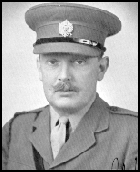John Baker White

John Baker White was born on 12th August 1902. He developed right-wing political opinions from his mother Katherine Blythe White, who was a close friend of Nesta Webster. His biographer, Mike Hughes argues that during the First World War, White did secret service work for Special Branch, via his stepfather, Gerald Hartley Atkinson. This included taking a sealed letter to Dublin. Later he was told that the envelope had contained a letter from David Lloyd George to Michael Collins.
After finishing his education at Malvern College he went to work for the Economic League. The organisation was set-up by George Makgill and William Reginald Hall and was dedicated to opposing what they saw as subversion and action against free enterprise. It also worked closely with MI5 to blacklist workers who they suspected of association with certain left wing groups.
George Makgill also set up the Industrial Intelligence Bureau (IIB). According to the author of Churchill's Man of Mystery (2009), it was "financed by the Federation of British Industries and the Coal Owners' and Shipowners' Associations, to acquire intelligence on industrial unrest arising from the activities of Communists, Anarchists, various secret societies in the UK and overseas, the Irish Republican Army (IRA) and other subversive organisations." White became one of IIB's secret agents. White called Makgill "perhaps the greatest Intelligence officer produced in this century."
In the 1930s White became a supporter of Adolf Hitler who he described as "a great man" with "very great ability, courage and perseverance". White added that Hitler had given back Germany's soul: "He has done more, he has given it that precious thing, self confidence, and hope in the future." However, he was concerned about what he considered to be the socialist aspects of Nazi Germany: ""In Germany today full-blooded Socialism is in practice so far as the administration of Industry and labour is concerned... and Nazism was... very similar to the beliefs of the social democrat and even of the less extreme communist".
According to Mike Hughes, the author of Spies at Work: Rise and Fall of the Economic League (1995): "If one man ever held a key to the complex interconnections between the Radical Right and the Secret State it was John Baker White, the veteran anti-communist and anti-socialist activist... His career encompassed a range of organisations which have played important roles in the development of the secret state. Freelance courier for Special Branch, adviser to MI5, MI10, the Political Intelligence Department of the Foreign Office, the Political Warfare Executive, Director of the Economic League for nineteen years and Publicity adviser for another twenty five."
During the Second World War he worked for MI5. A member of the Conservative Party he was elected to represent Canterbury in the 1945 General Election. He held the seat until 1953. White was active in the Freedom Association in Kent. He was also author of True Blue: An Autobiography (1970).
John Baker White died on 10th December 1988.
Primary Sources
(1) Mike Hughes, Spies at Work: Rise and Fall of the Economic League (1995)
If one man ever held a key to the complex interconnections between the Radical Right and the Secret State it was John Baker White, the veteran anti-communist and anti-socialist activist who died on December 10th 1988. From leaving Malvern College in 1920 (when he was eighteen) to his death, his career encompassed a range of organisations which have played important roles in the development of the secret state. Freelance courier for Special Branch, adviser to MI5, MI10, the Political Intelligence Department of the Foreign Office, the Political Warfare Executive, Director of the Economic League for nineteen years and Publicity adviser for another twenty five, Conservative MP (Canterbury 1945-53) and chair of a Freedom Association branch in Kent.
In addition to the occasional publication of propagandist tracts, White also published four important autobiographical books - "It's gone for good", "The Big Lie", "Sabotage is suspected" and "True Blue". They are at times frustratingly imprecise books, and at times straightforwardly misleading. Perhaps this is only to be expected from a professional propagandist, writing about politically sensitive issues. However unless they completely fabricate, rather than merely distort the truth, then they reveal the existence of two important and related, secret and private intelligence organisations that have so far more or less slipped through the parapolitical historian's net.
White left Malvern School with no clear idea of what he would do with his life and turned his hand to a number of short lived and out of the ordinary jobs. The first of these was for Special Branch. His step father, Gerald Hartley Atkinson had worked at Scotland Yard as unpaid personal assistant to Sir Edward Henry, Metropolitan Police Commissioner in the early years of the century. During the First World War Atkinson returned to Scotland Yard where he acted as (secretary) to Sir Henry Curtis-Bennett during the time when he was creating Special Branch. Shortly after leaving school, Atkinson offered White the opportunity to go to Dublin as a courier for him....
Although Atkinson gave White instant access to the fringes of the intelligence community, it was his mother Katherine (nee Blythe) who introduced him to militant anti-socialism. Katherine was a close friend of, and collaborator with, Nesta Webster. It was their influence that persuaded him to "devote my life to fighting communism" with what he himself recognised was a religious zeal. He consistently claims to have begun his undercover investigations of "subversion" as an independent amateur, though it must be at least presumed that he fed the information into Webster's sophisticated propaganda machine. He began this surveillance in London and Cambridge, attending meetings of the recently formed Communist Party of Great Britain.
